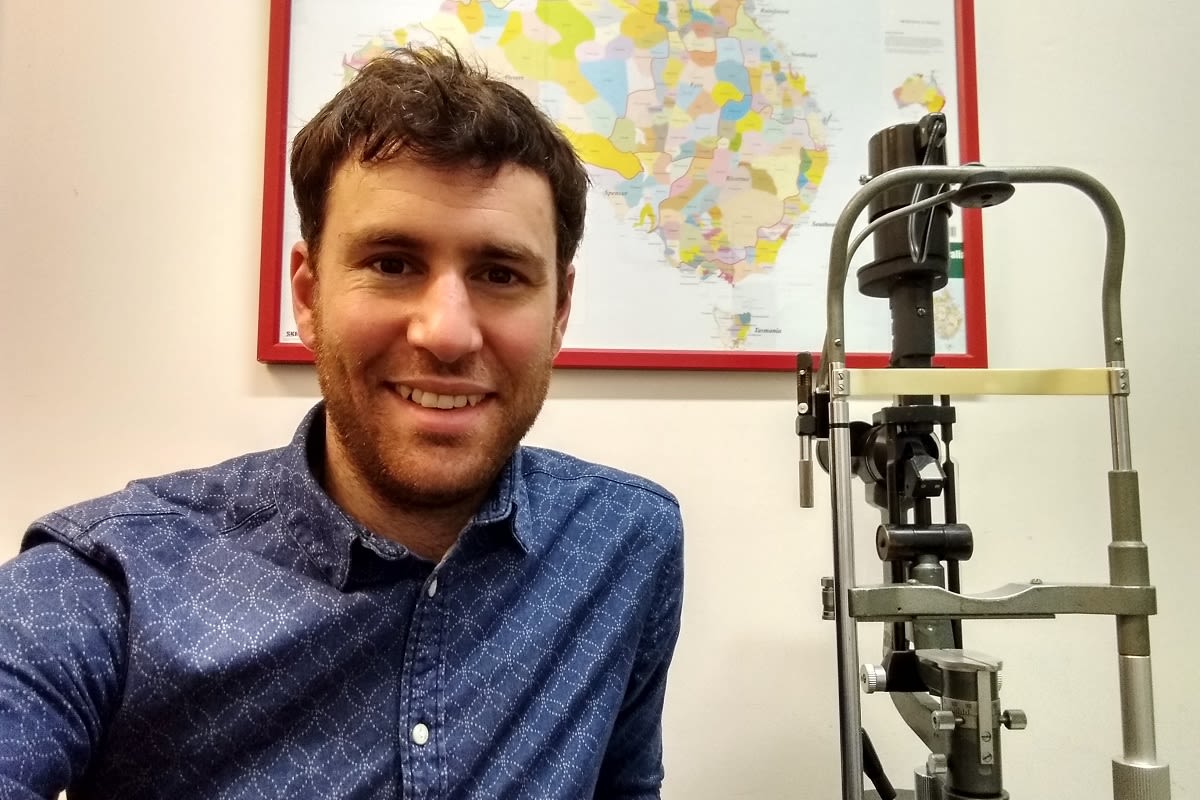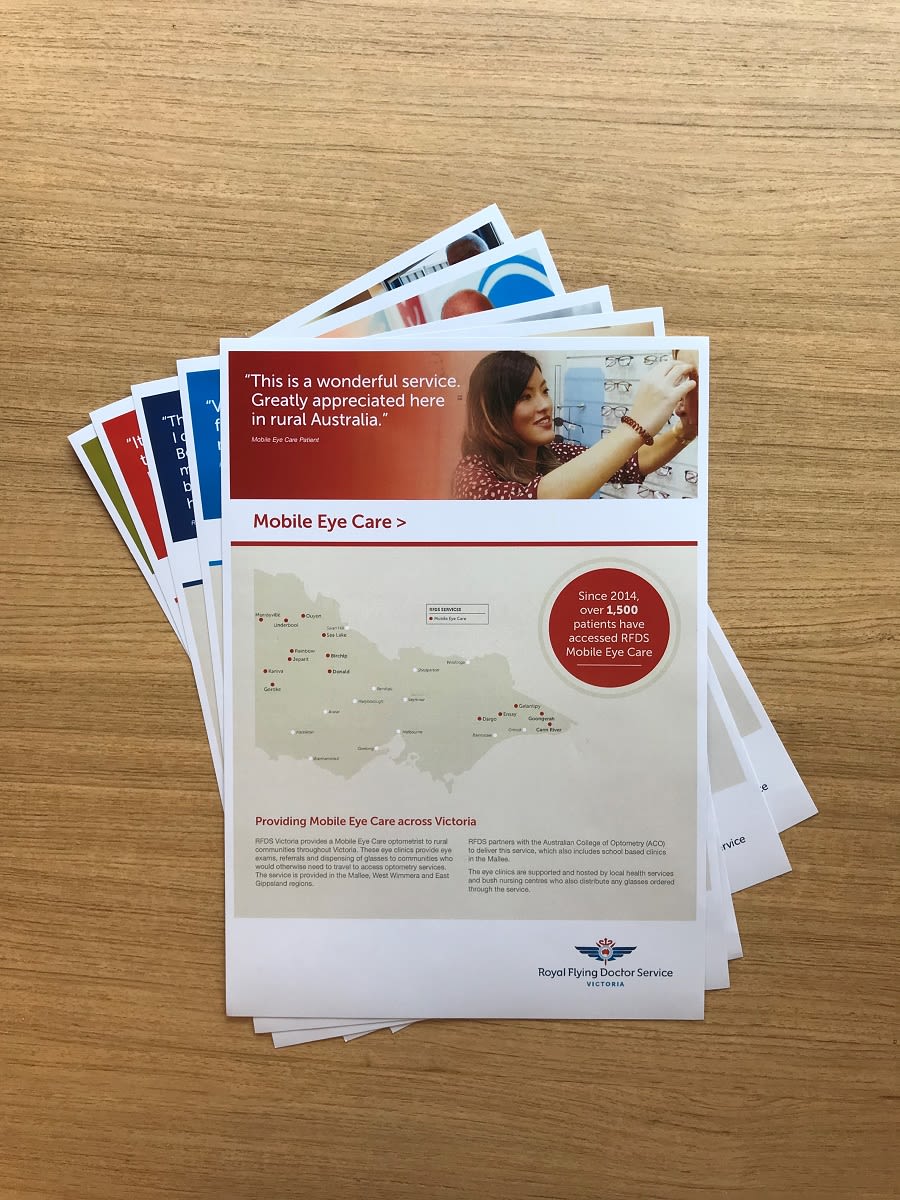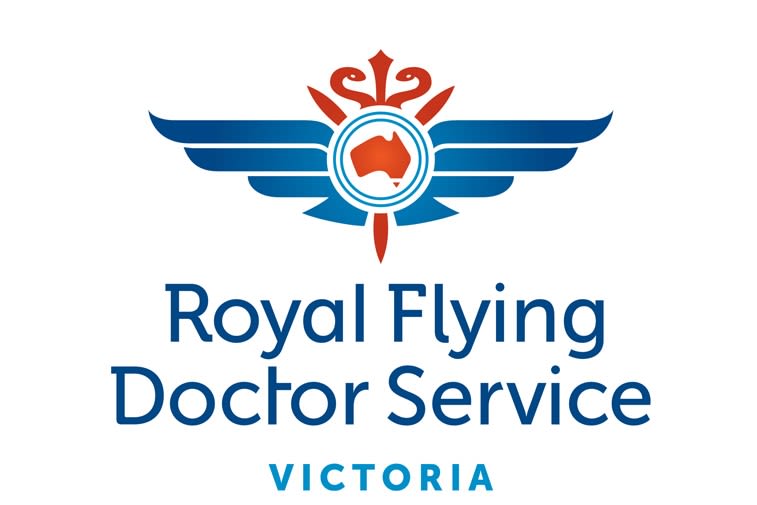Taking eye care on the road
As a part of RFDS Victoria’s Mobile Eye Care team, optometrist Luke Burns ensures that every Victorian can easily prioritise their eye health.

A career in optometry was the natural choice for Luke Burns, for a number of reasons.
“I was drawn to health care as it offered a pragmatic mix of something I find interesting that had the prospect of earning a good living, while also providing a benefit to society,” says Luke. “The eyes in particular are interesting, not only for being vitally important to a person’s quality of life, but for providing the proverbial window into a range of other aspects to a person’s health generally.”
Luke’s road to joining the Flying Doctor’s Mobile Eye Care team began at Melbourne University, before taking him to Bendigo, Echuca and Wangaratta and then, after an 18 month sojourn in Europe and the UK, to a role as a fly in-fly out optometrist seeing patients right around Australia. Finally, after a year as a locum, Luke took up his current position at the Australian College of Optometry (ACO) in March of 2019.
This position sees Luke working in a range of rural Victorian communities with the Flying Doctor’s Mobile Eye Care program, which is delivered in partnership with ACO and local health services. As a part of these mobile eye clinics, Luke provides eye exams and referrals, and dispenses glasses to local residents who would otherwise need to travel great distances to access optometry services.
Since joining the team, Luke has become a familiar face in such diverse areas as the Mallee, West Wimmera and East Gippsland regions.
“I love the sense of freedom and relaxation in getting out of the city and into wide open spaces, with more nature and fewer people,” says Luke. “I also enjoy experiencing a community with greater connection and collaboration between its members.”
Luke’s passion for these communities is palpable when he speaks about his gratitude at being able to help locals who would otherwise have nowhere to turn.
“I was lucky enough to get out of Melbourne towards the end of our long COVID-19 lockdown into an area that had been severely affected by the 2019/20 summer bushfires. Amongst my patients was a husband and wife who run a local school camp that also functions as a de-facto community hub, providing many services that are otherwise unavailable for 50-100km. The husband was also the leader of the local CFA division, who had managed to save the vast majority of properties in the area that had been under threat less than a year earlier.
“His case in optometry terms was quite simple: his long-sightedness had with age resulted in deteriorating near and distance vision and increasing headaches and eyestrain. It was great to be able to provide some advice and assistance to an individual who had been so stoic in providing for his community through very testing times.”
To Luke, Mobile Eye Care is a vital service for rural communities for the simple reason that everyone deserves adequate eye health checks to maintain good vision and prevent vision loss – not just those living in areas with these services easily accessible.
“From an ocular perspective, [one of the greatest health challenges facing rural communities] is simply the difficulty in accessing good quality care when a large numbers of patients is required to make a local service economically viable, and the service is not easily transportable.”
Luke also stresses that Mobile Eye Care, and optometry in general, is about more than just providing glasses, and this service is essential in helping to detect and either treat or refer patients with other, more serious eye conditions that can impact a person’s health much more severely.
“For example, an uncommon but semi-regular finding – I’ve had a couple in the past few months – is an asymptomatic blockage in an eye artery that is associated with a very high risk of stroke due to carotid artery blockage,” says Luke. “We can detect this and potentially prevent outcomes as serious as death in that instance.”
With services unavailable locally, Luke says that the best case scenario is that people will have to travel long distances to find an adequate service. Worst case scenario, they may forego help altogether.
“A large portion of the patients we treat are unable to travel to appointments and would miss out and potentially have to put up with poor vision or eye disease with no other care options. Many others may simply put it in the too hard basket and as such will miss out on adequate eye care,” says Luke.
Luke also identifies a cruel Catch-22 for many rural Victorians: people who need glasses in order to meet the driving vision standard can only access the glasses they need by driving to the nearest optometrist, which they cannot legally do without said glasses. It is to help rectify inequalities like this that Luke has chosen to work in the public health sector.
“I believe it is vitally important that health care is provided with the patient’s wellbeing as the first and foremost priority, and this is not always the case when certain sectors of the health care industry are driven by profit,” says Luke.
“It is an excellent feeling to be able to provide care in an environment such as the Mobile Eye Care service that is free from this burden.”

For more information about the Mobile Eye Care service, head to our website.

